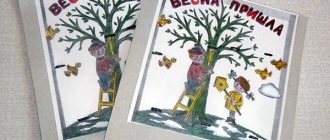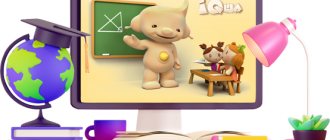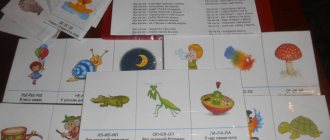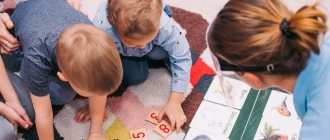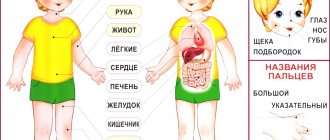Educational games for economic education of preschool children
Municipal autonomous preschool educational institution Child Development Center kindergarten No. 18 “Firefly” urban district of the city of Kumertau of the Republic of Bashkortostan
Educational games for economic education of preschool children
Prepared by the teacher
Khaliullina O.V.
2017
"Cafe "Tasty and Healthy"
Goal: to expand children’s knowledge about human needs for food, teach them to compare tasty and healthy products, and form the foundations of the economic culture of the child’s personality.
Material: menu with images of food products.
The teacher “invites” the children to the cafe. Each person has a menu with pictures of food items on their table. It is proposed to order the most delicious and healthy products, name them and compare which of them can be eaten often, which ones rarely and why.
"Tourist hike"
Goal: to clarify preschoolers’ knowledge about basic human needs.
Material: cards with pictures of different things.
Children are divided into three teams, each of which is preparing to go on a trip to the south, north, and into the desert. Teams can take only those things that they will need in the conditions in which they find themselves.
The items shown in the pictures are placed throughout the group room, and team members choose what they think they need most. At the end of the game, the teams check each other and explain their choices.
"Enterprises of our city"
Goal: to consolidate children’s knowledge about professions, to teach them to establish a relationship between the result of work activity and a person’s profession, to cultivate interest in people of different professions, and a respectful attitude towards them.
Material: photographs depicting workshops of various enterprises.
Children are given photographs depicting the workshops of city enterprises. They need to name the enterprise, the professions of the people working in it, and the products they produce.
"My Family Budget"
Goal: to expand children’s knowledge about the components of the family budget: salary, scholarship, pension; to form the foundations of the economic culture of preschoolers; cultivate respect for working people.
Material: cards depicting family members and the results of their work, money.
The teacher invites the children to divide into three families. Everyone needs to draw a card with a picture of family members, the result of their work. The amount of monetary reward for work is not indicated on the card; the children determine it themselves. Each family must determine its budget and at the end of the game compare who has it more. Family budget options may vary. For example, option 1: dad is a lawyer, salary..., mom is a salesperson, salary..., son is a student, scholarship...; option 2: dad is a driver, salary..., mom is a teacher, salary..., daughter is a 2nd grade student, etc.
"Warehouse"
Goal: continue to teach children to distinguish products according to their belonging to a certain group (furniture, clothing, shoes, household appliances, food, etc.).
Material: cards with images of goods, vans with the name of the stores where the goods will be delivered: “Shoes”, “Clothing”, “Food”, “Household Appliances”, “Furniture”.
The teacher invites children to act as delivery drivers and distribute goods using special vans to the appropriate stores: “Shoes”, “Clothing”, “Food”, “Household Appliances”, “Furniture”. Each delivery driver finds cards with goods for his store. The one who chooses the right product wins.
"Buying Tips"
Goal: to teach children to find a way out of the economic situation, to form the foundations of the economic culture of the child’s personality.
The teacher presents the children with various economic situations and asks them to resolve them. For each correct decision, a chip is given, and the one who collects the maximum number of chips wins.
Situation 1. When is it more profitable to buy a fur coat: in winter or summer? Why?
Situation 2. Apples were brought to the market. The seller Sveta received fresh, large apples with red sides, while the seller Kostya received small, wrinkled apples. They are priced the same. From whom will they buy apples faster?
Situation 3. The boy Misha decided to visit his sick grandmother and buy her bananas. In the store they cost 3 thousand, and in the market - 2 thousand. Where will Misha buy bananas? Why?
Situation 4. If milk prices become higher, what will happen to the prices of milk products?
Situation 5. When will apples and pears be cheaper: in summer or winter? Why?
Situation 6. What will the money be spent on: buying a car or a train ticket?
O. Prokofieva
Role-playing game on economics “The Good Fairy Store”
Target:
give children the opportunity to acquire what they want through purchase (through play action); teach how to choose a purchase, inventing the need for it for yourself; cultivate the ability to choose a purchase in accordance with the quality of its manufacture; to cultivate attentiveness, thrift, the ability to take an economical approach to choosing a product and purchasing a purchase; continue to enter the words sale, purchase into the active dictionary.
Equipment
: a doll in a blue dress, tickets for purchasing goods, goods in the form of homemade toys.
Preliminary work:
excursion to a flower shop.
The course of the role-playing game
IN.
Guys, we just recently were in a flower shop and bought flower seeds there. Well, does any of you remember the fairy tale “The Little Flower of Seven Flowers”? Yes, there were many miracles there! Would you like to find yourself in a fairy tale again? I thought that you would want to visit a fairy tale again. Today your wish will come true. A kind, wonderful Fairy invites you to her magic store.
The teacher shows a doll dressed in a beautiful blue dress and leads the children to the place where the Fairy's store is located. Through an audio recording, the Fairy addresses the children: “Hello, friends, I am very glad to welcome you to my store. Look carefully, what’s on sale?” (Children walk and carefully examine the product.)
IN.
Guys, since the Fairy’s store is magical, purchases here can only be made for special tickets, which the Fairy has prepared for you. But what a surprise! There were many more of you guys than there were tickets to buy. And therefore, the Fairy is forced to allocate only five tickets to each of you.
Therefore, you should choose those purchases that you really need. You can only make one purchase per ticket. How many purchases can you buy? Yes, that's right, only five. So now, when choosing a purchase, think about what you need to buy and what you will buy another time.
The teacher with the Fairy doll stands at the table where tickets are distributed for purchase. (The store also contains low-quality goods: a handbag with a torn handle, a torn napkin, etc.) The teacher monitors how the children choose their purchases.
During the game, the teacher invites the children to consult each other in choosing a purchase.
After the children have decided on the choice of goods, they evaluate it together with the teacher. The teacher clarifies whether the children are happy with the purchase. Next, everyone thanks the Fairy for the purchases. The teacher invites the children to examine the defective goods. Clarifies why no one bought these goods.
The fairy notes that these goods will be returned to the factories to eliminate the defects.
After the children discovered low-quality products, the Fairy explains to them that she specifically asked for this product to be brought unfinished in order to teach the children to be attentive when purchasing and to be able to evaluate a product based on the quality of its workmanship.
Economic game for children “Shop”
The purpose of the economic game:
to expand children’s understanding of what a store is;
give a new concept of “product”,
food and industrial products,
price;
types of stores;
consolidate children's knowledge of what money is needed for;
foster a culture of relationships between seller and buyer.
Progress of an economic game for children
V.
Guys, we know a lot about the history of money: how it appeared, what it was used before instead of money, what kind of money exists now in different countries.
The teacher repeats and reinforces with the children already familiar material on the topic: “Money and the history of its origin.”
IN.
What is a store? (Children's answers.) That's right, this is the place where people shop. What can you buy in the store? (Children's answers.) Who knows how to describe in one word everything that is sold in the store? (Product.) This means that a product is everything that is sold in a store.
Guess the riddle:
Guess what it's called
What money is being sold.
It's not a wonderful gift
But simply... (Product.)
Name food products, i.e. goods that can be bought in a store and eaten. (Bread, milk, eggs, candy, etc.)
Now try to name industrial goods (clothing, shoes, hats, etc.). (Children's answers.)
So, what kind of products do we have? (Food and industrial.)
Think, guys, what a buyer needs to have and what he needs to know in order to buy a product. (Have money, know the price.) What is price? (This is how much the product costs.) Is the price of the product always the same? (No.) This means that goods can be cheap and expensive.
Tell me, is it profitable for a buyer to buy a cheap product? Is it profitable for the seller to sell cheap goods?
This means that price affects how much of a product you can buy. (There are many cheap products, few expensive ones.)
Which product would you buy - cheap or expensive? Why?
Guys, on the one hand, it’s right when you save money by buying a cheap product, and you still have money left for another purchase. This is good.
But such a situation may also exist. For example, a store sells shoes.
One pair of shoes is cheap, but the quality is not very good, meaning they are not as comfortable. There is no guarantee that it will last long. In addition, these shoes are only available in large sizes.
The second pair of shoes costs more, but they are very comfortable and practical. This pair of shoes is made by a reputed company and is made from quality materials and its quality is guaranteed.
Which shoes would you buy - the one that is cheaper but of poor quality or the one that is more expensive but of higher quality? (Children's answers.)
It is necessary to draw children's attention to the fact that it is good to buy cheap goods, but it is also important to pay attention to the quality of the products. Sometimes, as you can see, it makes sense to buy an expensive, but higher quality item.
IN.
We have already found out that there are food products, and there are industrial goods. What kind of stores do we have? (Vegetable, bread, sausage, fish - food stores; furniture, shoe, "Clothing", etc. - industrial goods stores.)
What are the people called who work in a store and sell goods? (Sellers.) And those who buy these goods? (Buyers.)
What is the job of a store salesperson? For example, in a grocery store? And in a store that sells ribbons, buttons, fabrics? What about in a shoe store? (Children's answers.) Would you like to become a salesman in a store? (Children's answers.)
The teacher invites the children to play the role-playing game “Shop”. Draws attention to the culture of relationships between seller and buyer.
Didactic material for the course "Economics"
MBOU "Zuyat basic secondary school"
Didactic material
in the course "Economics"
(extracurricular activities)
Primary school teacher
Kustova Tamara Gennadievna
Knowledge of economic laws is necessary for modern man. The sooner the first acquaintance with their content occurs, the sooner the child meets them, the more active the process of his overall development will be. The primary school economics course does not aim to cover all economic categories. Students are given only a number of basic concepts that form the foundation for their future study of economics.
Students should know: economics is an accurate calculation, knowledge of basic economic laws, concepts, categories.
In such lessons, children learn to understand the role and importance of economics in the life of society, each family, and individual; at the level of ideas, get acquainted with the main economic categories. Teaching the ability to reason using economic concepts and making logical conclusions based on acquired knowledge is one of the objectives of these classes. It is important to show the connection between economics and other sciences.
Economics is an elective course. This should be kept in mind when preparing classes, without overloading the already rich program. A large number of problems to be worked on, the use of additional material and game forms of conducting classes are the key to success in studying economics.
The formation of a conscious and strong skill in handling economic concepts and categories is facilitated by their constant use not only in club classes, but also in other lessons. The club's classes are taught according to Tatyana Smirnova's textbook “Belka and Company,” in which the material is presented in the form of fairy tales about forest dwellers. To memorize “dry and boring” terms I use games, riddles, crosswords, which I first compose myself; during the lessons, children also join in this work with pleasure.
Purpose of the game: to introduce children in a playful way to the moral and ethical code of a modern entrepreneur.
Assignment: collect 10 rules of a successful entrepreneur from cut cards (the beginning of the rule is printed in one color, the end in another).
The work can be done in groups, pairs, or individually.
| SHOW RESPECT | TO THE LAW. |
| BE HONEST | AND TRUE. |
| RESPECT THE RIGHT | PRIVATE PROPERTY. |
| LOVE AND RESPECT | MAN OF LABOR. |
| THE WORD NEVER | NOT AT LEAST WITH THE BUSINESS. |
| BE REALISTIC | YOUR OPPORTUNITIES. |
| HAVE IT IN FRONT OF YOU | CLEAR GOAL. |
| WHEN ACHIEVING THE GOAL | DON'T CROSS THE LINE OF ALLOWED THINGS. |
| YOUR WORK SHOULD BE | USEFUL FOR SOCIETY AND THE STATE. |
| STRIVE FOR COOPERATION | WITH COMPETITORS. |
| at |
| With |
| P |
| e |
| X |
| O |
| V |
| V |
| A |
| m |
- Opened his own restaurant
And, of course, he hurried.
He didn’t even listen to his friends,
He even lost his house. (Fuchs)
- He lives in his hole,
He has a lot of worries.
He sheltered all his friends,
He opened his own hotel. (Badger)
- The house smells like pies
And hot pancakes.
It's cozy and warm here.
Who is its owner? (Squirrel)
- He will think seven times
Before you decide
Answering the question:
To be or not to be? (Puffing)
- He hears everything, knows everything.
He wants to be a mediator. (Magpie)
- Can help out friends
Remembering only your own benefit.
And I paid for it:
Her trade collapsed. (Rat)
- He is friendly with everyone,
Ready to help everyone.
But he's afraid of everything
When night comes. (Sniff)
To play you will need:
- large cards for players,
- cards for the presenter with definitions of economic terms,
- chips that cover the cells on large cards.
Rules of the game:
This game is played in the same way as regular lotto. Large cards with economic terms must be divided among the players. The presenter takes out one card from the bag, on which the definition of an economic concept is written, and reads this definition. Players who have a definable concept on the card raise their hand. The one who turns out to be the fastest (the same word is on several cards) receives a chip from the leader, with which he closes the cell. After all the chips are gone, they are counted. The winner is the one who closed the largest number of cells on his card.
Cards with definitions are added to the leader's bag as they are studied in class.
Cards for players
| PRODUCT | PRICE | COST PRICE |
| PROFIT | INTERMEDIAR | PLEDGE |
| RENT | TAXES | OWN |
| BANK | COMPANION | FINE |
| PROMOTION | COMPETITION | FINANCING |
| TAXES | PRODUCTION | AUCTION |
| BILL | BANKRUPTCY | INTERMEDIAR |
| SHARE | SHAREHOLDER | CO-OWNER |
| PROFIT | TRADE SECRET | FINE |
| CASH | STAGNATION | PRODUCTION |
| AUCTION | PRICE | BANKRUPTCY |
| TURNOVER | PLEDGE | MONOPOLY |
| BANKRUPTCY | CASH | RAW MATERIALS |
| FRAUD | OFFER | BANK |
| CORPORATION | DIVIDENT | TAXES |
| INSURANCE FUND | TRADE SECRET | CHECK |
| CONTRACT | BANKRUPTCY | |
| AUCTION | SALES MARKET | INTERMEDIAR |
| CUSTOMS DUTIES | INSURANCE FUND | CASH |
| MONOPOLY | DEMAND | PLANNING |
| PLEDGE | CONTRACT | COMPETITION |
| COMPANION | TURNOVER | PRODUCT |
| CASH | FARE | SHARE |
| BILL | CO-OWNER | CHECK |
| A CRISIS | SHARE | MONOPOLY |
| MARKET | RAW MATERIALS | OFFER |
| DIVIDENT | BILL | COST PRICE |
| DEMAND | CONTRACT | CUSTOMS DUTIES |
| CONCERN | CHECK | COMPETITION |
| COMPANION | TURNOVER | PRODUCT |
| FINANCING | TRADE SECRET | SHAREHOLDER |
| PRODUCT | OWN | DEFICIT |
| PROMOTION | FRAUD | CORPORATION |
| PLANNING | BANK | A CRISIS |
| FARE | RENT | PROFIT |
| SALES MARKET | STAGNATION | CONCERN |
Definitions written on leader cards
| Product of labor created for purchase and sale (product) |
| The cost of a product expressed in money (price) |
| Costs of production of goods by the manufacturer itself (cost) |
| Difference between price and cost (profit) |
| Someone who helps the seller and buyer find each other (intermediary) |
| Property or other assets of the debtor that serve as a guarantee of his solvency (collateral) |
| What we own, use and dispose of by right (property) |
| Providing property for use for a certain fee and for a certain period (rent) |
| Mandatory payments for everyone established by the authorities (taxes) |
| An institution that carries out various transactions with money and securities (bank) |
| A person who contributes money or labor to a common cause (companion) |
| The process of creating a product (production) |
| Rivalry between producers of goods for the most favorable conditions of production and sales (competition) |
| Monetary punishment for non-fulfillment or poor performance of the terms of the contract (fine) |
| Ruin (bankruptcy) |
| A security that indicates the contribution of funds to the capital of a joint-stock company (share) |
| Part of the profit, income received by shareholders (dividend) |
| Shareholder (shareholder) |
| A written promise to repay a debt by a certain date (bill) |
| A method of selling in which a starting price is announced and buyers compete to purchase the item (auction) |
| Share of funds contributed to the common cause (share) |
| A person who has the right to own part of the common property (co-owner) |
| Information that is of interest to competitors (trade secret) |
| Seme of prices of goods sold over a certain time (turnover) |
| Money that is in circulation, that is, used (cash) |
| A situation where production stands still and does not develop (stagnation) |
| An extreme degree of stagnation, when all problems become extremely aggravated, there is no way to resolve them (crisis) |
| Anything that requires processing to produce goods (raw materials) |
| A large enterprise that has seized power in production and the market (monopoly) |
| Relationships between buyers and sellers (market) |
| Social need for goods (demand) |
| Goods offered for sale (offer) |
| Costs for transportation and delivery of goods (transportation costs) |
| A document by which you can receive money from a bank (check) |
| Contract, agreement, for example, on the purchase and sale (contract) |
| The fee charged for the right to transport goods across the border (customs duties) |
| Providing funds for specific purposes (financing) |
| A combination of enterprises in which each of them cannot act as an independent entity (corporation) |
| A combination of enterprises in which one of them, with a controlling stake, becomes the main one and manages affairs (concern) |
| Lack of any product (shortage) Dishonest way of doing business, speculation (fraud) |
| General reserves from which damages in the event of an accident or unforeseen disaster are compensated (insurance fund) |
| All real and possible buyers (sales market) |
| A method of farming in which everything is calculated in advance and must be carried out according to calculations and on time (planning) |
